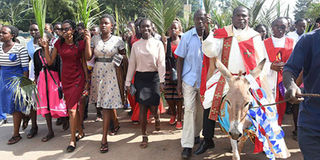Breaking News: KDF chopper crash kills five
Easter is a season of hope and a new lease of life to the weary

Reverend Kizito Muchanga of Kakamega Diocese leads faithful on April 14, 2019 in marking Palm Sunday. PHOTO | ISAAC WALE | NATION MEDIA GROUP
What you need to know:
- The Church dedicates 50 days from Easter Sunday to Pentecost as a special period called Eastertide to proclaim that death does not have the final say.
- The liturgical ceremonies of the Easter Vigil Mass on Holy Saturday include the blessing of fire and water as symbols of life and growth.
Easter is the festival commemorating the resurrection of Jesus of Nazareth, believed by his followers to have been raised from the dead as the Christ or the Anointed One.
Belief in the resurrection is the oldest and most controversial tenet or element of the Christian faith.
Religious scholars often make a distinction between the Jesus of history and the Christ of faith. In a word, Easter is the celebration of Jesus becoming Christ.
The term Easter can be traced to the Venerable Bede (673-735 AD) who uses it several times in his book, The Ecclesiastical History of the English People.
He borrowed the word from the name of the European goddess Eastre, whose festival fell on the spring equinox, March 21. Devotees of the deity believed she caused new life to sprout at the end of the winter season.
RESURRECTION
One of the earliest and most moving accounts of the resurrection is by Simon Peter, disciple and apostle of Jesus Christ.
Addressing worshippers at the temple of Jerusalem, Peter told the story of Jesus, the man who had gone about doing good but was rejected and killed (Acts 3: 11-15).
Peter’s proclamation was: “God raised him from the dead.” It is a compelling story recounted by the disciple, who had denied his master three times. He concludes his account by stating: “Of this, we are witnesses.”
The story of resurrection is the final resolution of the betrayal, suffering and death of a good man. For Peter and early Christian believers, death is not the last word.
Jesus is vindicated, or proved to be innocent, through his resurrection as the Christ.
PAIN AND DEATH
Peter, Paul and their congregations are grappling with some of the most difficult mysteries in human existence, the meaning of suffering and death.
For them, the risen Christ provides the answer. The irony of the matter lies in the fact that they are ready to die for their belief proclaiming that Jesus is alive.
The Church dedicates 50 days from Easter Sunday to Pentecost as a special period called Eastertide to proclaim that death does not have the final say.
Christians are believers in life after death, celebrated as the resurrection at Easter.
Suffering and death form part and parcel of the human condition. Science, philosophy and religion each has its answers to the questions of pain and death.
For many people, the problem is real and pressing, not theoretical or imaginary.
HOPE
Consider the recent tragedy of the air crash in Ethiopia in which all passengers lost their lives. Human language and analysis prove inadequate to explain the ultimate reason for and meaning of such a catastrophe.
Reflect on the unspeakable agony of family, friends and colleagues following the horrifying series of the murder of girls and women witnessed in the country. The list of bad news can be depressing.
One cannot forget that as a country, we are in the throes of a serious drought causing hunger, thirst and untold suffering to many.
Yet, in the midst of this gloom, there is a ray of hope. Brother Peter Tabichi, Franciscan monk and high schoolteacher, won the coveted Global Teacher Award, doing the country proud and raising its spirits.
The liturgical ceremonies of the Easter Vigil Mass on Holy Saturday include the blessing of fire and water as symbols of life and growth.
May this Easter be a season during which we all experience a new lease of life and the country is blessed with dew from the heavens.





